PEAK 8

Elevpaket – Tryckt + Digitalt 12 mån
LÄS OCH PROVA ELEVPAKETETS SAMTLIGA DELAR

PEAK 8

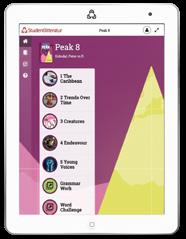


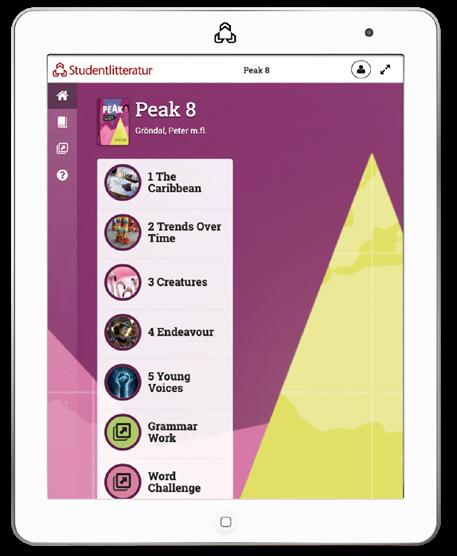
Elevpaket – Tryckt + Digitalt 12 mån

Med Peak 8 får du ett tematiskt engelskläromedel med tre nivåer. Den tryckta bokens texter finns i en lättläst, anpassad version i det digitala läromedlet.
TRE NIVÅER
Stream, Support och Stretch är de tre nivåer som Peak 8 är indelat i, vilket ger eleverna möjlighet att arbeta med samma tema på tre nivåer. Stream är utgångspunkten för klassens arbete och den nivå som finns i elevboken. I Support-delen finns förenklade texter, anpassningar och stödstrukturer. För elever som behöver mer utmaning finns extra texter och uppgifter i Stretch.
TEMAN OCH FÄRDIGHETER
Peak 8 erbjuder fem fängslande teman i en tydlig och återkommande struktur där alla färdigheter tränas. Temat börjar med ett inspirationsuppslag och sedan följer Watch med ett filmklipp, Read 1 och 2, Listen, Talk, Language Work, Write och Project Ideas
DIGITALT LÄROMEDEL
Till varje tema finns ett rikt digitalt material. Utöver de förenklade texterna till Support och fördjupningen Stretch finns autentiska filmer, ljudinspelningar med olika engelska varianter, självrättande ordövningar samt två fristående spår; Word Challenge och Grammar Work, som kan användas när som helst och efter behov.
Filmer, ljudinspelningar, hörövningar och andra självrättande övningar. De två nivåerna Support och Stretch finns i elevens digitala läromedel.
klicka på bilden och prova
Grammatikövningar och träning av högfrekventa ord.
TO THE TOP OF YOUR ABILITY!
Hippas Eriksson · Peter Gröndal
Pernilla Sundström · Nina Åkerlund
CONTENTS Stream
British
British
The Paralympics

American English
British
Teenage Activists
Vote at 16?
American English

Scottish English
British English
Grammar Work Online – exercises and tutorials online when, or if, you need them.

Word Challenge Online – expand your vocabulary by working with the most frequently used words.

Support – gives you an easier version and extra learning tools. Use these resources as an introduction or any time you need some support.

CHAPTER WATCH
1
2 LISTEN 1
4–19 Moko Jumbies Caribbean
Lost
Novel
Non-fiction
READ
READ
The Caribbean
English
at Sea
Caribbean English Slavery in the Caribbean
Interview
Caribbean English Being Gay in Jamaica
20–35 Trends vs
American
Being A Teen –the 80s Interview
Caribbean English 2 Trends Over Time
Fad
English
British English
News
Banned Fashion
items
36–49 Uglies Are the Spice Of Life
It’s Time To Close All Zoos Debate
News
English Weird Toy Fads A broadcast American English 3 Creatures
British English
article British English Cows
items
English Fighting Spiderfear Scientific article
50–63 Trailer
American English 4 Endeavour
Teaser American English The Butterfly Circus Film
Non-fiction
American English Circus Maxima Is Hiring! Job ad
64–79 March For Our Lives
Volunteer
in South
English 5 Young Voices
American English
Work
Africa Travel log
Newspaper
article
Argumentation
THE
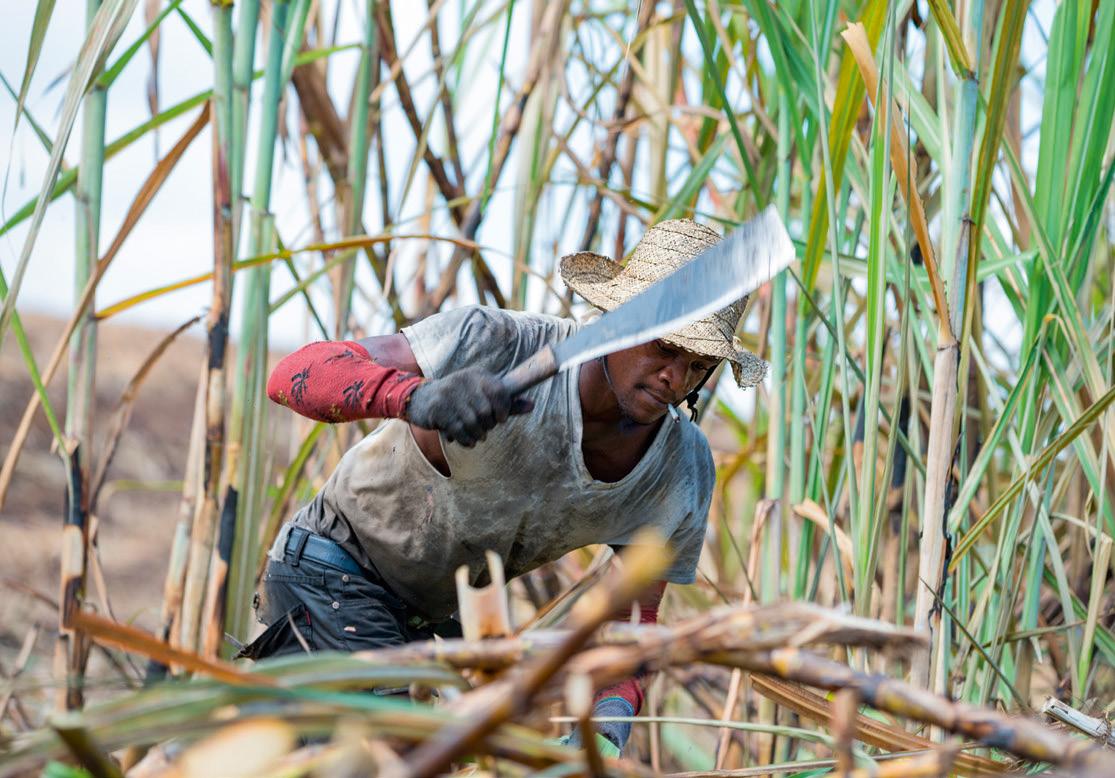
CARIBBEAN 1
The Caribbean is a group of islands that separates the Caribbean Sea from the rest of the Atlantic Ocean. The area is sometimes also called the West Indies.

4 1
TARGETS
• Read an extract from the novel Gone to Drift about a boy whose grandfather is missing after a fishing trip.

• Learn about slavery in the Caribbean, mysterious stilt dancers in the British Virgin Islands, and being gay in Jamaica.
• Describe the countries of the Caribbean and why they are worth a visit.


GET GOING
• Look at the pictures. What do they show?
• Which countries of the Caribbean can you name?
• What do you know about the Caribbean?


5 1
MOKO JUMBIES
00:05:46
BEFORE WATCHING
1. What do you know about the British Virgin Islands?
2. Have you ever walked on stilts? What was it like?
1. What are Moko Jumbies?
2. How tall are the stilts?
3. How did the tradition of Moko Jumbies come to the British Virgin Islands?

4. What are Moko Jumbies traditionally believed to do?
5. What do Moko Jumbies mostly do today?
reigns regerar
inhabited befolkade off the beaten track bortom allfarvägarna
stilts styltor
tripping trippa, gå med lätta steg attached to fäst vid due to på grund av
expelled drev ut
evil spirits onda andar
anxious här: ivrig, otålig
workshop verkstad
christen döpa
bless välsigna
WATCH
AFTER WATCHING
6 1
LOST AT SEA
One day his grandfather doesn’t return from a fishing trip to Pedro Bank. Lloyd is worried. Is his grandfather lost at sea?
The boy sat beside the crumbling wall and stared out to sea. It was full dark and rain hissed on the water, but he was sheltered from the downpour where he sat. He saw a swirl of phosphorescence in the sea, gone so quickly he might have imagined it, might have merely wished for it because it was his grandfather who had told him about the tiny creatures that lived in the sea and at night shone blue in the wakes of boats and drew the deep ghostly shapes of fish. His grandfather said Kingston Harbour had once been full of them, that no night’s fishing would have passed without seeing the shining mystery. “Where they go, Gramps?” the boy had asked.
“Sea too dirty for them.”
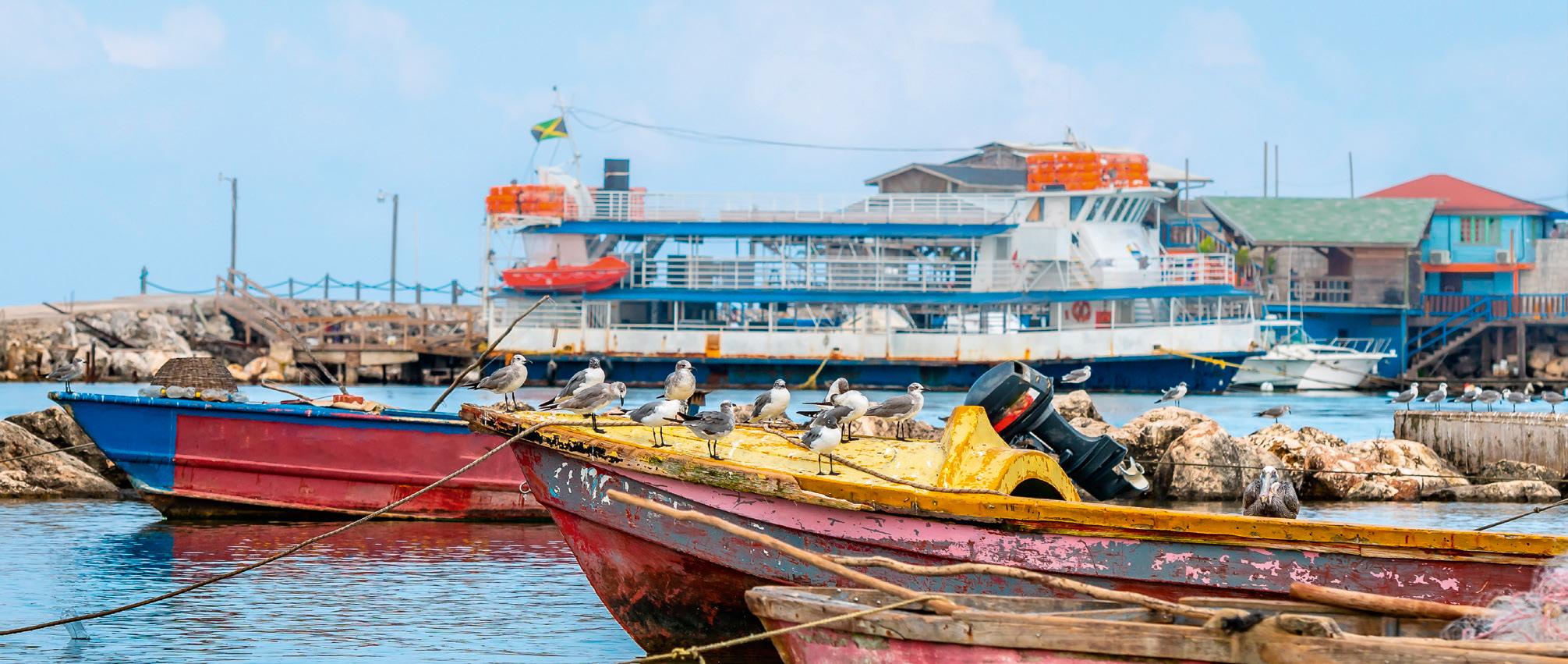
crumbling förfallna
hissed brusade
sheltered skyddad
downpour störtregn
swirl virvel
phosphorescence
merely endast
ljusskimmer
WORD LIST CARIBBEAN WORDS
wakes kölvatten
waste avfall
padlock hänglås
damp fuktigt
narrow trånga, smala
READ 1
Young Lloyd lives in Kingston, Jamaica. He comes from a long line of fishermen and feels most at home with the sea and his grandfather, Maas Conrad, at his side.
5 10
7 1
“Why the sea get dirty?”
His grandfather had grunted. He was a man of the sea, not a man of words. Now Lloyd was sure he was lost at sea.
No one else was worried yet. Maas Conrad was only a day overdue from his trip to the Pedro Bank.
“Lloyd? But where the pickney is, eeh? Him is pure crosses. Only the good Lord know the trouble I seen.” It was his mother’s voice. Lloyd stood and turned to meet her. “You want get sick, pickney?” she said. “Out here inna the pourin rain a nighttime?” She stood under the brightly colored umbrella someone had left on the bus and she had taken. “Come.You grandfather be awright.You think the sea can kill him?”

Lloyd walked toward his mother and the shelter of the umbrella and together they walked through the dark streets of Kingston, the rainwater sweeping the streets, hiding the smell of human waste, taking the garbage of the city into the sea. Lloyd heard his grandfather’s voice in his mind: I come from a line of fishermen.
Lloyd held the umbrella while his mother struggled with the front-door padlock of their small house near Bournemouth on the edge of Kingston Harbour. The nearest streetlight had blown many years before. His mother kissed her teeth. “Me tired to tell you wut’less father to buy one new lock,” she said. Finally, the lock scraped open and they went inside. The air was full of water and the house was damp. “Go to bed, pickney. As God is my witness, you nah be a fisherman. As God is my witness.”
pickney barn awright alright
waste avfall
padlock hänglås
kissed her teeth smackade ogillande wut’less (worthless) värdelös
damp fuktigt
nah inte
15 20 25 30 35 40
8 1
He went into the narrow room at the back where he slept and untied the shower curtain tacked to the top of the door opening. There was no lightbulb or lantern in his room but light from the only other room in the house crept under the curtain, which smelled of plastic and mildew; smells of home to him. There was no window in his small space and he imagined it was like a cabin in a ship, below the waterline. He had never been on a big ship but he had seen them in Kingston Harbour making their slow way into and out of port –containerships, tankers, ships picking up gypsum from the gypsum wharf or flour from the flour mill, sitting in a cloud of dust as they loaded up. He thought of them as sea buildings, sea businesses.
He stripped off his wet clothes and hung them over the sagging line that held his school uniforms, pushing the uniforms to one side to make space for his undershirt and shorts. He dried himself with his rag and changed into the torn briefs he wore at night. He sat on his cot and felt hungry. Had he finished the bun from lunchtime? He thought so, but looked through his backpack just in case he had left a small piece. He found only the wrapper and he licked it for the crumbs, for the cinnamon and sugar smell.
“Lloydie?” his mother called as the wrapper crackled. “You hungry? Some fry sprat and bammy is here; come nuh?”
“Me awright,” he answered, although saliva flooded his mouth at the thought of fried fish and bammy. His grandfather might be hungry, wherever he was, so Lloyd would be hungry too.
He lay down and closed his eyes. He saw Water Bird alone at sea on a moonless night, lost, missing land by miles.
Why had his grandfather gone to the Pedro Bank? He was not a Pedro fisher. A man had to motor almost sixty nautical miles to find the Pedro Bank, sixty miles in an open boat, with no navigational equipment, no radio; just eyes and experience and stamina. The Pedro Bank was an underwater mountain southwest of Jamaica with three
cabin hytt
wharf hamn, kaj
gypsum gips
mill kvarn
cot säng
cinnamon kanel
sprat skarpsill
bammy (tunn)bröd
navigational equipment navigeringsutrustning
stamina uthållighet
cays sandöar, korallöar
inshore nära kusten
sewage avloppsvatten
vendors
gatuförsäljare
45 50 55 60 65 70
9 1
small cays – Top Cay, Middle Cay, and Bird Cay – and the fishing was still good. Although Gramps knew how to find the Pedro Bank, he never went there. He fished instead at Bowditch and the California banks and where the bottom of the sea fell off into the deep.
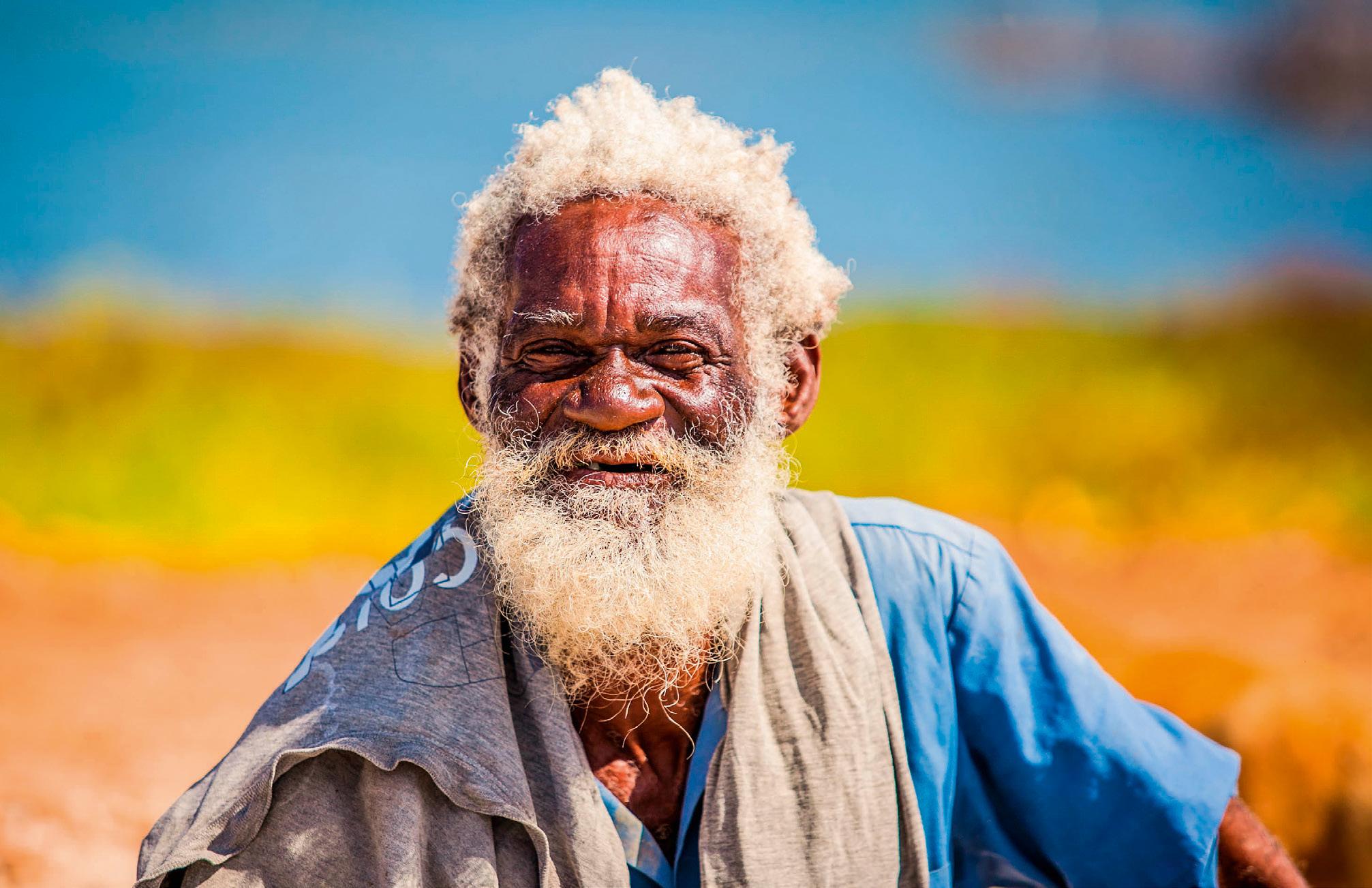
There were few fish inshore these days. Of course there were the fishers who cast their lines and nets close to the old sewage pipes emptying into Kingston Harbour where the garbage floated, and they did catch fish. But Lloyd’s grandfather was not one of those men. He did not sell his fish to the women vendors who used burial fluids to make the fish look fresh. He would never use dynamite or chlorine to kill fish and make them float to the surface. No one had to tell Gramps when lobster season closed, or that Queen conch never lived where there were shattered conch shells on the floor of the sea, or that parrot fish should be left to graze the reef.
burial fluids begravningsvätskor
lobster hummer
conch snäcka
pots tinor (ett slags fiskeredskap)
wasteful ödeläggande, slösaktiga
juveniles unga fiskar
eels ålar
75 80 85
10 1
Maas Conrad was a deepwater fisherman, a line fisher. He did not use nets or pots, because, he explained, those methods were wasteful, catching everything above a certain size: trash fish, juveniles, eels, turtles. Lloyd had first gone to sea with his grandfather before he was a year old, so his mother said, just for a spin around the Harbour, over the shoals of gray and green, into the flat calm water of the Port Royal mangroves. His mother said he had not cried. Later, when the boy had learned an awkward doggy-paddle that he could keep up for many hours in the water, he wondered about that first sea trip, which he did not remember: Where had he sat in the boat? What would have happened if the boat had hit a reef and sunk? He was sure his grandfather would have carried him safely in his arms to land.
Reading comprehension
The different ways to read and understand a text are called ‘reading strategies’. One strategy is to read a text very closely. Reading a text closely means to read it bit by bit, passage by passage, and to ask yourself what the author wants to tell us about the setting, the characters or the story in each part of the text.
Work in pairs and use this strategy when you read Lost at Sea again. Focus on these questions:
• Is Lloyd’s family rich or poor?
• What kind of a man is Lloyd’s grandfather Maas Conrad? How would you describe him?
Collect all the clues you can find to help you answer these questions. You can make a list with two columns: Quotes and Clues for each question.
Example:
Quotes Clues
She stood under the brightly colored umbrella Lloyd’s mother might not afford to someone had left on the bus and she had taken. buy an umbrella herself.
He was a man of the sea, not a man of words. Maas Conrad doesn’t talk a lot.
TARGET WORDS
shoals (vatten)massor reef rev
90 95
From Gone to Drift by Diana McCaulay
NOVEL 11 1
SLAVERY IN THE CARIBBEAN
Often when we talk about slavery, we focus on slavery in the United States. However, slavery was widespread not just in North America but also in the Caribbean and South America. African heritage has greatly impacted the Caribbean as we see it today.
Slave trade
From the 16th to the 19th century about 12 million Africans were taken from their land and transported to the New World as slaves. Caribbean colonies received about 5 million Africans, compared to the nearly 400,000 brought to the United States. The slaves, many of them from West Africa, were sold at auctions upon arrival in Caribbean colonies. To present the slaves in the best possible condition to potential buyers, the slaves were scrubbed, and their wounds filled with hot tar before auction.
Sugar plantations
The European colonizers bought the slaves to work on the sugar plantations in the Caribbean. They believed that because the Africans came from a hot and tropical climate similar to the Caribbean, they had a better chance of surviving there.
Sugar was an increasingly popular and valuable product and sugar cane was the main crop in the Caribbean during this time. The Caribbean plantations produced 80–90 per cent of the sugar consumed in Western Europe. Slaves were held in very large units and most plantations had approximately 150 slaves or more. Producing sugar was hard, labor-intensive work and every slave was expected to work, including women, children and the elderly. It was common for slaves to work 18-hour days during harvest time, while some slaves worked for as long as 48 hours without a break. As a result of the dreadful working conditions the slave death rate in the Caribbean was extremely high.
widespread utbrett heritage arv impacted påverkat trade handel received tog emot arrival ankomst tar tjära
plantations plantager colonizers kolonisatörer increasingly alltmer valuable värdefull
sugar cane sockerrör crop gröda units enheter
approximately ungefär producing tillverka
labor-intensive arbetskrävande elderly äldre
harvest skörd
dreadful förskräckliga death rate dödlighet
READ 2
5 10 15 20 25
12 1
Slave revolts
One of the earliest slave revolts in the New World took place in Jamaica. The rebels, called the Maroons, rose against the plantation owners. They destroyed plantations, freed other slaves and then fled to the mountains for safety. The Maroons ambushed British military from their mountain hideaways. One of their leaders was a female warrior named Nanny, who was known as an outstanding military leader. After decades of trying to control the Maroons, the British finally granted them land and freedom. Nanny was later named a Jamaican National Hero, and was the first woman to be awarded the honor. Her face appears on the Jamaican $500 banknote.

End of slavery
In the early 19th century, the movement to abolish slavery grew in Britain. The British slave trade officially ended in 1807 and this made the selling and buying of slaves from Africa illegal. In 1834 slavery was abolished in the British Caribbean.
Reading comprehension
1. How many slaves were taken to the Caribbean?
2. Where did the slaves mainly come from?
3. What happened when the slaves came to the Caribbean?
4. Why did the European colonizers grow sugar cane?
5. What was life like for the slaves on the plantations?
6. What did the Maroons do?
7. Who was Nanny?
8. What happened in 1807 and 1834?
9. What other examples of slavery throughout history do you know about?
10. Does slavery still exist today? Explain your answer.
rose här: gjorde uppror ambushed låg i bakhåll för hideaways gömställen warrior krigare decades årtionden
granted beviljade honor utmärkelse banknote sedel movement rörelse abolish avskaffa
TARGET WORDS
30 35 40 NON-FICTION 13 1
BEING GAY IN JAMAICA
LISTEN
Homophobia is the fear of homosexuality and people attracted to the same sex. The word is used to describe disapproval of and prejudice or discrimination against gay people.
BEFORE YOU LISTEN
What do you know about gay rights and the situation for gay people in Jamaica?

topic ämne
human rights mänskliga rättigheter community grupp, gemenskap
intimacy intimitet, närhet
penalty straff
interpret tolkar
fuels underblåser, understödjer affect påverkar
Christians kristna
rhetoric retorik
lyrics (musik)texter
promote främja
cabinet regering abuses övergrepp
attention uppmärksamhet
increasing ökar
visible synlig
mayor borgmästare
referendum folkomröstning
outcome resultat
survey undersökning
overwhelming överväldigande
setbacks bakslag, motgångar
LISTEN
14 1
WELCOME TO THE CARIBBEAN
Sugar sand beaches, high mountain peaks, colorful reefs in crystalclear water, shimmering hummingbirds, deep rolling reggae … the islands of the Caribbean have a lot to offer to visitors.

Tourism is an important part of the economies of the Caribbean countries. If your job was to get more people to visit the Caribbean, what would you focus on? In groups, you and your classmates will present the Caribbean in a podcast.
Your teacher will tell you more.
TALK
15 1
AMERICAN VS BRITISH ENGLISH
The differences between British and American English grammar are small. Here are the main differences.
Americans often use the past simple where British people use the present perfect (especially with just, already and yet).
AMERICAN ENGLISH BRITISH ENGLISH
Zoe just arrived. Zoe has just arrived. Did you talk to Carl yet? Have you talked to Carl yet? I already saw the show. I’ve already seen the show.
Americans often use have (with do or does in negatives, questions and short answers) where British people use have got.
I have two sisters.
I’ve got two sisters. I don’t have a bike. I haven’t got a bike.
– Do you have any money?
– Yes, I do
– Have you got any money?
– Yes, I have
British people use got as the past participle of get. Americans often use gotten
I’ve gotten a broken nose!
I’ve got a broken nose!
There are some differences in spelling. For example:
traveled travelled color colour theater theatre
There are also some differences in the use of words and in their meaning.
zip code postcode
elevator lift
French fries chips
Work together with a classmate and make a list of more words that are different in American and British English.
LANGUAGE WORK
WORD CHALLENGE GRAMMAR WORK
16 1
COUNTRIES OF THE CARIBBEAN
There are many independent countries in the Caribbean. How much do you know about them? Choose one of the countries below and write a text to present it.

Jamaica
Barbados
The Bahamas
Trinidad and Tobago
Saint Kitts and Nevis
Antigua and Barbuda
Your teacher will tell you more.
STRETCH Go to the next level WRITE Finished with The Caribbean STREAM?
17 1
PROJECT IDEAS
1 Practise your English by reading one of the texts from the chapter aloud to yourself or a classmate. Focus on pronouncing all the words correctly. Record yourself.
Talking/Pronunciation 25 points
2 Miranda Phillips lives in St Vincent and the Grenadines. Watch the film “Miranda’s Laundry” and write a text about a day in Miranda’s life.
Watching/Writing 75 points
3 Jerk Chicken is a popular Jamaican dish. Find a recipe and translate it into Swedish. If you want to know how tasty it is, cook it and invite your family or friends to a Caribbean dinner party!
Vocabulary/Language work 50 points
4 Have you seen any of the movies in the Pirates of the Caribbean series? The period from the late 1600s to the early 1700s is sometimes called the “Golden Age of Piracy”, and pirates like Blackbeard and Henry Morgan sailed the Caribbean Sea. Find out more about piracy in the Caribbean and make a poster for the classroom or a digital presentation.

Research/Writing 75 points
5 The dialogue in Lost at Sea is written in Jamaican English, with different words and spelling than in British English. Rewrite the dialogue in the text into British English vocabulary and spelling.
Language work/Vocabulary 25 points
6 You and your family are on holiday in the Caribbean for two weeks. Write a letter to a friend or a relative back home and tell them about your holiday in the Caribbean. Writing 50 points
18 1
7 Bob Marley is perhaps the most famous of all reggae musicians. With his band The Wailers he made reggae music popular all around the world with songs like One Love, Waiting in Vain and Three Little Birds. Work in pairs or small groups. Choose one of his songs and translate the lyrics to Swedish. Try to capture the rhythm and the rhyme in your translation so it can be sung. Sing both versions with your classmates! Group activity/Language work/ 50 points

8 Tourism is very important for the economy in the Caribbean nations. But what are the advantages and disadvantages of tourism? Look into this and write an essay with the heading Tourism – Pros and Cons. Research/Writing 100 points
9 Pick 20 words that were new to you from the chapter. Write an explanation in English for each of them. Find a free online crossword puzzle maker. Create a crossword puzzle and let a classmate try to solve it.
Vocabulary/Writing 25 points
10 Prepare a multiple-choice quiz about the Caribbean and present it to the class. Include at least three different countries in the quiz. Research/Writing 50 points
11 The green turtle can be found in the Caribbean Sea. It is one of the largest sea turtles and it is important to the ecosystem. Unfortunately, the green turtle is an endangered species. Find out more about the green turtle and the threats it faces and present the information to your classmates.
Research/Presentation 50 points
12 In Listen you learned about being gay and LGBTQ rights in Jamaica. Listen to the interview again or read the transcript of the listening exercise. Write down at least three personal reflections afterwards. Listening/Writing 50 points
19 1
Förenklade
MOKO JUMBIES
00:05:46
Before watching
1. What do you know about the British Virgin Islands?
2. Have you ever walked on stilts? What was it like?
After watching part 1
1. What are Moko Jumbies?
2. How tall are the stilts?
After watching part 2
1. How did the tradition of Moko Jumbies come to the British Virgin Islands?

2. What are Moko Jumbies traditionally believed to do?
3. What do Moko Jumbies mostly do today?
reigns regerar
annexed la beslag på, införlivade archipelago ögrupp inhabited befolkade off the beaten track bortom allfarvägarna
stilts styltor
tripping trippa, gå med lätta steg attached to fäst vid due to på grund av expelled drev ut evil spirits onda andar
anxious här: ivrig, otålig workshop verkstad
christen döpa
bless välsigna
Kopiering
© 2023 Författarna
Studentlitteratur
tillåten
och
AB THE CARIBBEAN WATCH
SUPPORT
versioner av texterna i elevboken med stödstrukturer och anpassad layout gör att alla elever kan följa klassens arbete.
LOST AT SEA
Lloyd is 12 years old. He lives in Kingston, Jamaica, with his mother and his grandfather, Maas Conrad. Maas Conrad is a fisherman.
Lloyd has been going out to sea with his grandfather since he was very little. His grandfather teaches him about the sea and the creatures in it. Lloyd always feels most at home with his grandfather at his side.
One day his grandfather doesn’t return from a fishing trip.
Lloyd is worried. Is his grandfather lost at sea?
When we first meet Lloyd, he is sitting by the sea, waiting for his mother to finish work. She is a vendor at the fish market. When his mother comes, they walk together through the streets of Kingston.

It’s dark and raining.
creatures varelser vendor gatuförsäljare
Kopiering tillåten © 2023 Författarna och Studentlitteratur AB THE CARIBBEAN READ 1 NOVEL
SUPPORT
Lloyd walked toward his mother and the shelter of the umbrella and together they walked through the dark streets of Kingston, the rainwater sweeping the streets, hiding the smell of human waste, taking the garbage of the city into the sea.

Lloyd heard his grandfather’s voice in his mind:
I come from a line of fishermen.
Lloyd held the umbrella while his mother struggled with the front-door padlock of their small house near Bournemouth on the edge of Kingston Harbour. The nearest streetlight had blown many years before.
shelter skydd
waste avfall
garbage sopor
padlock hänglås
edge utkant blown gått sönder
Kopiering tillåten © 2023 Författarna och Studentlitteratur AB THE CARIBBEAN READ
1
SUPPORT
His mother kissed her teeth. “Me tired to tell you wut’less father to buy one new lock,” she said. Finally, the lock scraped open and they went inside. The air was full of water and the house was damp “Go to bed, pickney. As God is my witness, you nah be a fisherman. As God is my witness.”
When you kiss your teeth you make a hissing (väsande) sound with the mouth. It is often used to show disapproval (ogillande) or anger toward something.
In British English: “I’m tired of telling your worthless father to buy a new lock”.
damp fuktigt
In British English: “Go to bed, child. As God is my witness, you will not be a fisherman. As God is my witness”.
He went into the narrow room at the back where he slept and untied the shower curtain tacked to the top of the door opening. There was no lightbulb or lantern in his room but light from the only other room in the house crept under the curtain, which smelled of plastic and mildew; smells of home to him.
There was no window in his small space and he imagined it was like a cabin in a ship, below the waterline.
narrow trånga, smala
shower curtain duschdraperi tacked fastspikat
lightbulb glödlampa
lantern lykta
mildew mögel
cabin hytt
Kopiering tillåten © 2023 Författarna och Studentlitteratur AB
THE CARIBBEAN
1. Where does Lloyd and his mother live?
1
READ
SUPPORT
He stripped off his wet clothes and hung them over the sagging line that held his school uniforms, pushing the uniforms to one side to make space for his undershirt and shorts. He dried himself with his rag and changed into the torn briefs he wore at night. He sat on his cot and felt hungry. Had he finished the bun from lunchtime? He thought so, but looked through his backpack just in case he had left a small piece.
He found only the wrapper and he licked it for the crumbs, for the cinnamon and sugar smell.
2. What does Lloyd’s room look like?
3. What does Lloyd do when he gets to his room?
sagging slakande
rag trasa
torn slitna
cot säng
wrapper omslag
crumbs smulor
cinnamon kanel
TARGET WORDS
Kopiering tillåten © 2023 Författarna och Studentlitteratur AB
THE CARIBBEAN
READ 1
SUPPORT
From
Gone to Drift
by Diana McCaulay
BLACK CRAB
In the search for his grandfather, Lloyd learns that there is one man who might know what has happened to his grandfather. The man is called Black Crab. Lloyd and his best friend Dwight go to find him.
Lloyd and Dwight made their way to Newport West next day. Lloyd told himself he was on a quest. His sidekick was Dwight. Black Crab would know where he could look for Gramps. And if it was Portland Rock, he would go there next.
The Shotta bar was a plywood structure with a slanted tin roof, like a lean-to. Dancehall music throbbed from two large speakers on either side of the bar. Two old men with lowered heads sat on bar stools. Beyond them, a fisher worked on a fish pot under a sea grape tree. There was no beach.
The barman had reddened eyes. Lloyd ordered a Pepsi in two cups without ice and the barman brought them. The boys sat at the bar and looked around. Apart from the two men at the other end of the bar, there was a thin black man sitting right in front of the speakers with a cell phone to his ear. He was dressed in torn jeans and an undershirt and another cell phone buzzed on a metal table in front of him.
“We ask the barman for Black Crab or what?” Dwight whispered.
“Shh! Just cool,” Lloyd said. “Make us wait a little and see what happen.” Nothing happened. The man on the phone ended his call and wandered outside. The barman closed his eyes and his head fell forward. A mouse ran across the packed dirt floor. It was hot in the tiny bar—the sea breeze had not yet come up.
Lloyd rapped the bar and the barman jumped. “You know a man name Black Crab?”
The barman’s head came up and he met Lloyd’s eyes. “What you want with him? You not from ’round here?”
“Bournemouth,” Lloyd said and instantly regretted it. It was best not to tell anyone where you lived. “Just want ask him a question, boss.”
“Black Crab don’t so much like question. But you young still. CRAB!” he shouted over the music. “This yout’ here want a word.”
The boys turned to see the thin black man who had been on the phone walking toward them. He did not look scary in the least. As he walked up to them, Lloyd saw he was older than he had first thought. He had a seagoing look around his eyes, which were scored with wrinkles. His arms were ropy,
CARIBBEAN STRETCH
STRETCH Ytterligare texter och uppgifter inom temat som utmanar och breddar kunskaperna.
as if he spent hours drawing a net. His skin was black but it had the fisher’s tinge of salt. “You askin for me, yout’?” His voice was soft but Lloyd heard an echo of menace in the simple words.
Lloyd slid off the stool and stood in front of the man called Black Crab. “Boss,” he said. “Me is Lloyd. Lloyd Saunders. This my friend Dwight. We from over by Gray Pond fishin beach. Me—”
“How you come to be lookin for Black Crab?” The truth or a story? Lloyd decided on the truth. “Me is lookin for my granddaddy, Maas Conrad him name. Him lost at sea. Him go the Pedro Cays, eleven day now, and him don’t come back. Nobody heard from him. So—”
“What that have to do with me? Where you get my name from?”
“We hear,” Dwight said. “We just ask around and we hear. We hear say you know about the foreign people what come here to buy dolphin. We hear you is a big man so we come find you.”
Black Crab did not react to Dwight’s voice. His eyes remained fixed on Lloyd, who became aware that the two old men were leaving the bar. The barman followed them, shaking his head. The music pounded and the bar was too dark. “Boss,” Lloyd said. “Me don’t mean no disrespect. Please. Me don’t care if dolphin catch for whatever reason. Catch them all, me say, long as man can eat a food from it. But my granddaddy, him is an elder. Him hold to the old ways. All me want know is if him see sumpn him not suppose to see and if him is hurt somewhere, alone somewhere. That’s it. It don’t go no further than me and Dwight. Me can’t hurt you, me know how to keep my mouth shut. Me is not a informer.” Lloyd stopped. He had not said the right words, the words that were in his heart. Is he dead? Will his body ever be found? Will I ever know who killed him?
Black Crab stared into Lloyd’s eyes. “Informer to dead. Right, yout’?”
Lloyd nodded. No one spoke and the music blared. Finally, Black Crab said, “Where you granddaddy fish from?”
“Gray Pond beach. That’s where him keep his boat.”
“What him boat name?”
“Water Bird.”
“You have a cell?”
“No, boss.”
“WINSTON!” Black Crab bawled and the barman came running over. “Pass a paper and pen.” Winston looked under the counter and Lloyd saw his hands were trembling. He handed over an exercise book of the kind the boys used in school and a ballpoint pen. Black Crab tore out a piece of paper and wrote on it shaking the pen to make it write. “This my number. Call me in a week—”
“A week!” Lloyd said. “Suppose him is hurt, starvin, no water, somewhere on the coast or lost in the boat with no engine.”
“You love you granddaddy, yout’. That a good thing. Me did have a
CARIBBEAN STRETCH
STRETCH
STRETCH
CARIBBEAN STRETCH
granddaddy too. Awright. You call me tomorrow. Then you throw away that paper. You forget the name Black Crab, you hear me? You go school, you play a little ball, you help you mother, you go sea, you do whatever you do. Me don’t want see or hear from you again, seen?”
“Yes, boss. Thank you, boss,” Lloyd said. “Tomorrow.”
The boys turned to go. “Me can ask you one thing, boss?” Dwight said. Lloyd pinched his arm but the words were out.
Black Crab said nothing but his eyes narrowed and moved to Dwight’s face. Lloyd was suddenly afraid for his friend. “Why them call you Black Crab?” Dwight asked.
The man called Black Crab laughed. “But see here now. Why you think? Them call me that ’cause me love eat black crab!”
EXCERCISES
Choose one or more of the exercises.
1. What do you think has happened to Lloyd’s grandfather, Maas Conrad? Will Lloyd find him? Write the ending to the story.
2. Write a script for the scene at the Shotta Bar. Include both dialogue and stage directions. Rehearse the scene and act it out for your classmates.
3. The dialogue in Black Crab is written in Jamaican English, with different words and spelling than in British English. Rewrite the dialogue in the text using British English vocabulary and spelling.
4. Work in pairs. Write 7–10 questions each to be used for testing reading comprehension. Then answer each other’s questions in writing or verbally.
Med Peak kan hela klassen arbeta med samma tema – var och en mot toppen av sin förmåga.
Fem teman med en mångfald av perspektiv
Peak erbjuder fem fullmatade och fängslande teman som är lite utöver det vanliga. Strukturen är tydlig, men variationen är stor och det bjuds på en mångfald av ämnen, perspektiv, genrer, engelska röster och uppgiftstyper. I varje tema finns film, två texter varav en är en faktatext, en hörövning samt utvecklande uppgifter som tränar alla färdigheter.
Tre nivåer stödjer och fördjupar
Stream, Support och Stretch är de tre nivåer som Peak är indelat i. Stream är utgångspunkten för klassens arbete och finns både tryckt och digitalt. I det digitala läromedlet finns Support, med förenklade texter och stödstrukturer samt Stretch med nya utmaningar inom temat i form av ytterligare texter och uppgifter.
Peaks textbok är en allt-i-ett-bok med både texter och övningar. Textboken kan återanvändas eftersom eleverna dokumenterar sitt arbete på valfritt sätt utanför boken.
Digitalt läromedel med inlästa texter och filmer
I det digitala läromedlet finns alla tre nivåerna; Stream, Support och Stretch. Texterna i Stream och Support är inlästa med många olika regionala varianter av engelska. Det finns självrättande ordövningar baserade på varje temas texter och autentiska filmer som introducerar respektive tema. Digitalt finns också två fristående spår; Word Challenge Online som tränar högfrekventa ord och Grammar Work Online med förklarande filmer.
Till Peak 8 hör också ett värdefullt lärarpaket med såväl handledning som extra resurser.
För aktuell information om serien se studentlitteratur.se/peak.
studentlitteratur.se
Art.nr 43062

































